In September 2022, Advance CTE and ECMC Foundation announced the second cohort of The Postsecondary State Career Technical Education (CTE) Leaders Fellowship at Advance CTE—Sponsored by ECMC Foundation. The Advance CTE — ECMCF Fellows include representation across multiple demographic categories reflecting the Fellowship’s goal of intentionally building a postsecondary leadership pipeline for underserved populations in Career Technical Education (CTE) that closes racial representation gaps and removes equity barriers to postsecondary leadership advancement.
This month, we’re excited to highlight two members of Advance CTE’s second cohort of Postsecondary State CTE Leaders Fellows. In our interview with ECMCF Fellow Yolanda Flores (FL), she talked about how she’s already leveraging what she learned in the Fellowship to create more cohesive and industry-aligned programs.
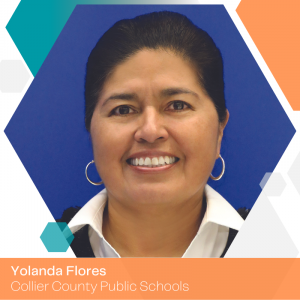 Tell me more about your journey to the Fellowship.
Tell me more about your journey to the Fellowship.
I discovered the Fellowship by accident. The Florida Association for Career and Technical Education included the call for applicants in an email, and as someone who is constantly searching for opportunities to grow my skills to serve my students, I was immediately interested. I met Dr. Kevin Johnson during the informational webinar, and I felt like the Fellowship’s focus and curriculum topics were aligned with my professional goals.
What skills or areas have you experienced the most growth in the program?
The number one thing that I’ve learned is the value of mentorship and working with my coach. Advance CTE staff provided some suggestions for our monthly meetings, such as sharing updates on the real-world project and the workshop topics, but then my coach and I would also talk about things that are going on outside of the Fellowship and the work that my coach is doing. In a lot of ways, we were able to bounce ideas off each other and this thought partnership has been critical in my professional development.
This relationship also allowed me to travel to Seattle for Jobs for the Future’s convening. All of the attendees and participating organizations were exploring different models of career pathways. I discovered an apprenticeship model that operates as a third-party entity, coordinating the various providers involved with implementing the program. This model was developed to be very flexible and prioritized accessibility for all students. I walked away feeling inspired with knowledge about how I can recreate and replicate these best practices for my students back in Collier County.
How has your experience in the Fellowship helped you explore new spaces or positions in postsecondary state CTE leadership?
The national focus of this Fellowship has been incredibly valuable. I’m learning an immense amount during workshops from leaders from across the nation and the perspectives of my colleagues in the Fellowship. I am eager to take this momentum and find additional opportunities to leverage my experience in a way that continues to make a meaningful impact for learners. Coming from the district level, this experience and knowledge are crucial because, without it, I’m worried that I would not be considered for more advanced roles.
I’ve set up my LLC, Workforce Wise Solutions, to take on additional consulting work to continue to develop my skills and build my portfolio of work. I am working closely with the Florida Institute for Professional Development for Adult Educators. This work is closely aligned with my real-world project topic, of increasing access to CTE for adult learners particularly those for whom English is not their first language.
The topic of my real-world project is about increasing access to high-wage, high-skill, in-demand CTE career pathways in manufacturing for adult education participants. Through my project, I’ve been able to engage more with the Workforce Innovation and Opportunity Act (WIOA), Perkins and Florida Blueprint 2030 and understand how adult education programs interact in these spaces. I’ve been able to review our Perkins data, which includes data on our underserved populations and English for Speakers of Other Languages population, and the progress that we’re making in supporting these learners as they transition from adult education to CTE programs. I coordinated a professional development group where staff from the CTE programs, adult education, and business partners came together to learn about how they could better align their programs. As a result of this process, I was able to write a grant proposal that identified the ways in which our local providers are prepared to work and design their programs in alignment with industry needs. My proposal for this Equitable Pipeline Grant would allow us to propose a manufacturing IET, integrated education and training program. This program will then help prepare our adult education learners with a foundation for understanding manufacturing concepts with the goal of eventually transitioning into one of our full-time programs or going into a position where they can be upskilled. I did receive the Equitable Pipeline Grant for $122,000 and another $60,000 to provide scholarships to adult education students enrolled in Nursing Assistant and ParaPro.
Another benefit of this Fellowship has been learning more about the wealth of organizations that exist in this space and the work they’re engaged in around CTE. I would love to learn more about best practices for communicating the findings from this work to local practitioners. How can we, as directors or program leaders, ensure that our programs are being developed with the knowledge of what has worked elsewhere. Building this awareness is a huge opportunity to lean in, and I believe the impact could be significant.
How has the Fellowship expanded your network?
I have a great group of Fellows that are helpful for bouncing ideas off each other. Also, I’ve found that the assigned accountability buddies have given us permission to reach out and have conversations about our work and the challenges we might be experiencing. My buddy has been a source of encouragement, and I’m not sure we would have independently taken steps to make those connections.
I’ve also enjoyed the relationship and support I’ve received from the Advance CTE staff. Dr. Stephanie Perkins’ feedback has been so helpful and available to meet as needed for additional support to complete my real-world project.
The opportunities to engage with state leaders and national organizations have been great. I’m eager to take advantage of these platforms, such as the ECMCF Convening in Denver, to elevate my work.


 Tell me more about your journey to the Fellowship.
Tell me more about your journey to the Fellowship. 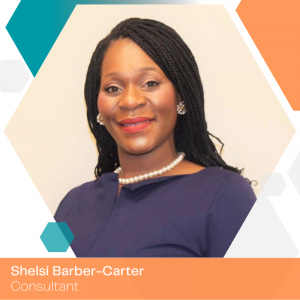 Tell me more about your journey to the Fellowship.
Tell me more about your journey to the Fellowship.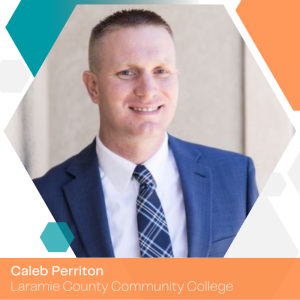 I was made aware of the Fellowship through the Wyoming State CTE Director Michelle
I was made aware of the Fellowship through the Wyoming State CTE Director Michelle  Administration of a CTE program with an equity lens begins with ensuring all learners have meaningful access to and substantial engagement in high-quality CTE programming which requires making these actions a priority. Ohio has created and applied equity-minded leadership principles within
Administration of a CTE program with an equity lens begins with ensuring all learners have meaningful access to and substantial engagement in high-quality CTE programming which requires making these actions a priority. Ohio has created and applied equity-minded leadership principles within 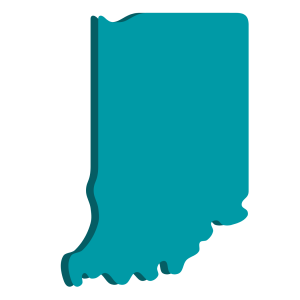 The application of equity-minded principles isn’t a one-time occurrence. It requires an ongoing systematic review of policies, practices and data to determine the effectiveness of the mitigating or transformational strategies being applied. Indiana engaged in this process by conducting a review of the CTE equity labs being offered in their state and using additional resources to measure goal attainment and to provide additional supports to local leaders.
The application of equity-minded principles isn’t a one-time occurrence. It requires an ongoing systematic review of policies, practices and data to determine the effectiveness of the mitigating or transformational strategies being applied. Indiana engaged in this process by conducting a review of the CTE equity labs being offered in their state and using additional resources to measure goal attainment and to provide additional supports to local leaders. 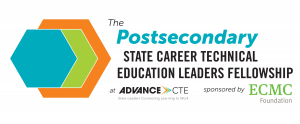
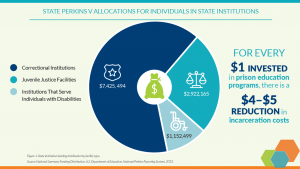
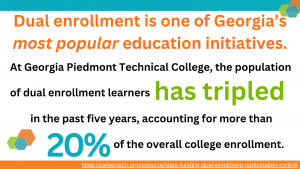
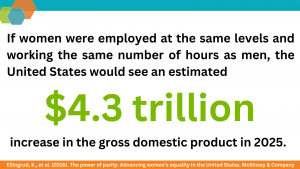
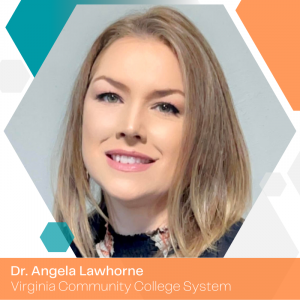 Tell me more about your journey to the Fellowship.
Tell me more about your journey to the Fellowship.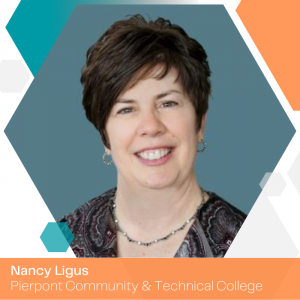 Tell me more about your journey to the Fellowship.
Tell me more about your journey to the Fellowship.
 Caleb Perriton’s career began in the automotive industry as an international trainer prior to entering the world of postsecondary CTE. Currently, he serves as Program Director of the Trades & Technical Studies Pathway at Laramie County Community College. He is an ASE Certified Master Automotive Technician and earned a bachelor’s degree in automotive technology from Weber State University and master’s degree in business administration from the University of Wyoming.
Caleb Perriton’s career began in the automotive industry as an international trainer prior to entering the world of postsecondary CTE. Currently, he serves as Program Director of the Trades & Technical Studies Pathway at Laramie County Community College. He is an ASE Certified Master Automotive Technician and earned a bachelor’s degree in automotive technology from Weber State University and master’s degree in business administration from the University of Wyoming.  Dr. Luv’Tesha Robertson
Dr. Luv’Tesha Robertson 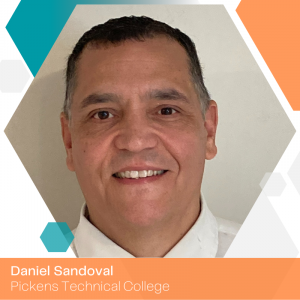 Daniel Sandoval is passionate about cultivating self-reliance among learners and students from marginalized populations and has focused on serving immigrant, economically disadvantaged, racially underrepresented and linguistically diverse communities. His range of experience includes grant writing and administration, managing apprenticeship and credential attainment initiatives, and serving in leadership roles in postsecondary student services. Currently, Sandoval serves as the Director of Customized Training and Apprenticeships at Pickens Technical College and as a Psychology instructor at the Community College of Aurora. He earned a bachelor’s degree in English writing from Colorado Mesa University and a master’s degree in counseling psychology from the University of Colorado at Denver.
Daniel Sandoval is passionate about cultivating self-reliance among learners and students from marginalized populations and has focused on serving immigrant, economically disadvantaged, racially underrepresented and linguistically diverse communities. His range of experience includes grant writing and administration, managing apprenticeship and credential attainment initiatives, and serving in leadership roles in postsecondary student services. Currently, Sandoval serves as the Director of Customized Training and Apprenticeships at Pickens Technical College and as a Psychology instructor at the Community College of Aurora. He earned a bachelor’s degree in English writing from Colorado Mesa University and a master’s degree in counseling psychology from the University of Colorado at Denver.